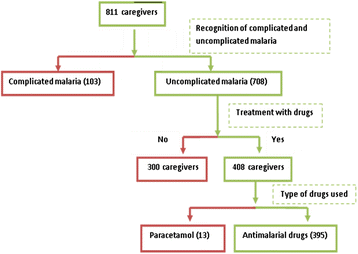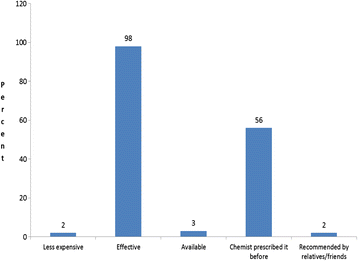Factors associated with appropriate home management of uncomplicated malaria in children in Kassena-Nankana district of Ghana and implications for community case management of childhood illness: a cross-sectional study
- PMID: 25934315
- PMCID: PMC4429811
- DOI: 10.1186/s12889-015-1777-3
Factors associated with appropriate home management of uncomplicated malaria in children in Kassena-Nankana district of Ghana and implications for community case management of childhood illness: a cross-sectional study
Abstract
Background: Home management of uncomplicated malaria (HMM) is now integrated into the community case management of childhood illness (CCM), an approach that requires parasitological diagnosis before treatment. The success of CCM in resource-constrained settings without access to parasitological testing significantly depends on the caregiver's ability to recognise malaria in children under five years (U5), assess its severity, and initiate early treatment with the use of effective antimalarial drugs in the appropriate regimen at home. Little is known about factors that influence effective presumptive treatment of malaria in U5 by caregivers in resource-constrained malaria endemic areas. This study examined the factors associated with appropriate HMM in U5 by caregivers in rural Kassena-Nankana district, northern Ghana.
Methods: A cross-sectional household survey was conducted among 811 caregivers recruited through multistage sampling. A caregiver was reported to have practiced appropriate HMM if an antimalarial drug was administered to a febrile child in the recommended regimen (correct dose and duration for the child's age). Binary logistic regression was used to determine factors associated with appropriate HMM.
Results: Of the 811 caregivers, 87% recognised the symptoms of uncomplicated malaria in U5, and 49% (n = 395) used antimalarial drugs for the HMM. Fifty percent (n = 197) of caregivers who administered antimalarial drugs used the appropriate regimen. In the multivariate logistic regression, caregivers with secondary (OR = 1.71, 95% CI: 1.03, 2.83) and tertiary (OR = 3.58, 95% CI: 1.08, 11.87) education had increased odds of practicing appropriate HMM compared with those with no formal education. Those who sought treatment in the hospital for previous febrile illness in U5 had increased odds of practicing appropriate HMM (OR = 2.24, 95% CI: 1.12, 4.60) compared with those who visited the health centres.
Conclusions: Half of caregivers who used antimalarial drugs practiced appropriate HMM. Educational status and utilisation of hospitals in previous illness were associated with appropriate HMM. Health education programmes that promote the use of the current first line antimalarial drugs in the appropriate regimen should be targeted at caregivers with no education in order to improve HMM in communities where parasitological diagnosis of malaria may not be feasible.
Figures
Similar articles
-
Antimalarial drug use among caregivers in Ghana.Afr Health Sci. 2004 Dec;4(3):171-7. Afr Health Sci. 2004. PMID: 15687069 Free PMC article.
-
Caregivers' treatment-seeking behaviors and predictors of whether a child received an appropriate antimalarial treatment: a household survey in rural Uganda.BMC Infect Dis. 2016 Sep 6;16(1):478. doi: 10.1186/s12879-016-1815-5. BMC Infect Dis. 2016. PMID: 27600604 Free PMC article.
-
Integrated community case management and community-based health planning and services: a cross sectional study on the effectiveness of the national implementation for the treatment of malaria, diarrhoea and pneumonia.Malar J. 2016 Jul 2;15(1):340. doi: 10.1186/s12936-016-1380-9. Malar J. 2016. PMID: 27371259 Free PMC article.
-
Impact of home-based management of malaria on health outcomes in Africa: a systematic review of the evidence.Malar J. 2007 Oct 8;6:134. doi: 10.1186/1475-2875-6-134. Malar J. 2007. PMID: 17922916 Free PMC article. Review.
-
Caregivers' treatment-seeking behaviors and practices in Uganda-A systematic review (Part II).Acta Trop. 2015 Dec;152:269-281. doi: 10.1016/j.actatropica.2015.07.029. Epub 2015 Aug 7. Acta Trop. 2015. PMID: 26259818 Review.
Cited by
-
Socio-cultural barriers to the delivery and utilisation of child healthcare services in rural Ghana: a qualitative study.BMC Health Serv Res. 2022 Mar 3;22(1):289. doi: 10.1186/s12913-022-07660-9. BMC Health Serv Res. 2022. PMID: 35241071 Free PMC article.
-
Exploring the spatial variation and associated factors of childhood febrile illness among under-five children in Ethiopia: Geographically weighted regression analysis.PLoS One. 2022 Dec 30;17(12):e0277565. doi: 10.1371/journal.pone.0277565. eCollection 2022. PLoS One. 2022. PMID: 36584143 Free PMC article.
-
Knowledge and Skills of Mothers/Care Givers of Children Under Five Years in Communities with Home Based Management of Malaria in Tamale, Northern Region, Ghana, 2013.AIMS Public Health. 2016 Nov 11;3(4):923-932. doi: 10.3934/publichealth.2016.4.923. eCollection 2016. AIMS Public Health. 2016. PMID: 29546204 Free PMC article.
-
Low use of artemisinin-based combination therapy for febrile children under five and barriers to correct fever management in Benin: a decade after WHO recommendation.BMC Public Health. 2018 Jan 22;18(1):168. doi: 10.1186/s12889-018-5077-6. BMC Public Health. 2018. PMID: 29357869 Free PMC article.
-
Caregiver responses and association with delayed care-seeking in children with uncomplicated and severe malaria.Malar J. 2018 Dec 18;17(1):476. doi: 10.1186/s12936-018-2630-9. Malar J. 2018. PMID: 30563514 Free PMC article.
References
-
- World Health Organization. World Malaria Report. Geneva, Switzerland: WHO; 2013. ISBN 978 92 4 156469 4. http://www.who.int/malaria/publications/world_malaria_report_2013/wmr201.... Accessed 24 May 2014.
-
- World Health Organization. World Malaria Report 2005. Geneva, Switzerland: WHO; 2005. WHO/HTM/MAL/2005.1102.
-
- World Health Organization. The African Summit on Roll Back Malaria, Abuja, Nigeria. Geneva, Switzerland: WHO; 2003. WHO/CDS/RBM/2003.46. http://whqlibdoc.who.int/hq/2003/WHO_CDS_RBM_2003.46.pdf. Accessed 25 April 2014.
Publication types
MeSH terms
Substances
LinkOut - more resources
Full Text Sources
Other Literature Sources
Medical



